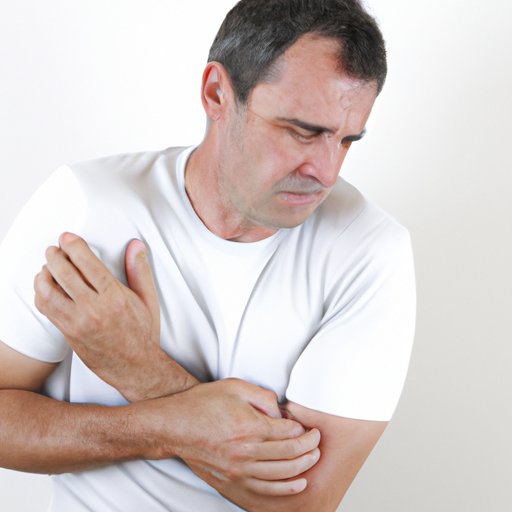
Introduction
Hernias are a common condition that occurs when a body part pushes through a weak area of muscle or tissue. This can lead to discomfort and pain, especially when left untreated. In this article, we will explore various ways to relieve hernia pain.
Hernia Pain Relief: The Top 5 Home Remedies
If you are experiencing mild hernia pain, you may find relief through various natural remedies, including:
Applying Heat or Cold
Applying a heating pad or cold compress to the affected area can help alleviate pain and inflammation. Both heat and cold therapies can work well depending on the individual. Experiment with both and use the one which works best for you.
Practicing Correct Posture
Improper posture can aggravate hernia pain. Maintaining good posture can help to strengthen the core muscles and reduce the risk of a hernia getting worse. Make sure to sit up straight and avoid slouching when sitting or standing.
Taking Over-The-Counter Pain Medication
Over-the-counter pain relief medication, such as ibuprofen, can provide temporary relief from hernia pain. However, you should always follow the instructions and dosage recommendations on the packaging and seek advice from your doctor or pharmacist before using these medications.
Using a Hernia Support Garment
A hernia support garment can offer support and relieve pain by reducing the pressure on the hernia. These garments come in various shapes and sizes and can be used either under or over your clothing. Make sure to consult your doctor before using one.
Avoiding Strenuous Activities
While it is essential to stay active, high-impact exercises and strenuous activities can exacerbate hernia pain. Take it easy and avoid lifting heavy weights, running, or doing any other high-pressure activities that could strain your hernia.
From Yoga to Surgery: Finding the Best Way to Relieve Hernia Pain
The level of hernia pain and discomfort is different for everyone, so finding the most effective approach to alleviate hernia pain takes effort. Here are different approaches used to help relieve pain:
Gentle Exercise
Gentle low-impact exercise, such as yoga and Pilates, can help alleviate hernia pain. These exercises help to improve blood flow and strengthen the muscles around the hernia. Speak to your doctor before embarking on a new exercise routine.
Physical Therapy
Physical therapy can help relieve hernia pain by strengthening the abdominal muscles. A physiotherapist can work with you to develop an exercise program tailored to your needs and medical condition.
Natural Remedies
Aside from the five home remedies mentioned previously, there are various other natural remedies that can help alleviate hernia pain. These include acupuncture, herbal remedies, and massage therapy. However, like any medical treatment, speak to your doctor before embarking on a new therapy.
Surgery
If the hernia is causing severe pain or inhibiting your daily activities, surgery is the last resort. The operation repairs the damaged muscle tissue, thereby alleviating any associated discomfort and danger. Speak to your doctor for advice on this option, surgery.
Expert Advice: A Doctor’s Guide to Alleviating Hernia Pain
We interviewed a medical professional to provide us with treatment advice.
Non-Surgical and Surgical Options
Non-surgical options like those mentioned before work for mild hernia cases. However, for severe hernia cases, surgical intervention is necessary. There are two types of hernia surgeries: herniorrhaphy and hernioplasty. Both methods cut off new points of hernias and strengthen the damaged muscle tissues with an implant like a mesh or sutures.
Tips for Postoperative Recovery
The recovery period can be painful and challenging, after hernia surgery. You will need to plan an adequate recovery period to recover well. The surgeon’s wound-closure method will dictate the recovery time, but for the most part, you will need to take it easy within the first couple of weeks after surgery. Do not lift anything that is heavier than what your doctor suggests. You should avoid constipating bowel movements that could cause strain to your abdomen; anesthesia can cause constipation. Over-the-counter stool softeners or natural remedies like prune juice will help. Follow your doctor’s advice and attend your follow-up appointments.
The Dos and Don’ts of Hernia Pain Relief
Here are some general guidelines for managing hernia pain:
What to Eat and Drink
Eating a balanced and fiber-rich diet can help to promote regular bowel movements and reduce constipation, which can worsen hernia pain. Avoid spicy, acidic, or greasy foods that may irritate your stomach, and try to drink plenty of water, at least eight glasses per day.
How to Move and Rest
Avoid sudden movements that can aggravate your hernia and cause pain. If you need to lift anything, make sure to bend your knees and keep your back straight. Lying on your back can be the most comfortable position, which can reduce pressure on the herniated area. Sleeping on your stomach or side may cause discomfort.
How to Identify Warning Signs that Indicate when Medical attention is Necessary
You should seek medical attention for hernia pain if you experience worsening symptoms, including nausea, vomiting, difficulty passing gas or bowel movements, or sudden, intense pain around the hernia.
When Is Hernia Pain a Sign of a Serious Condition?
If you experience a sudden, severe pain in the abdomen, coupled with vomiting and constipation, you should seek medical attention immediately. These symptoms could indicate a strangulated hernia, a potentially life-threatening condition that occurs when the blood supply to the herniated area is cut off.
Conclusion
Relieving hernia pain is possible with various home remedies, appropriate exercises, and surgical interventions. Understanding your condition and seeking timely medical advice is essential to develop an effective treatment plan that will address your symptoms. Remember to follow your doctor’s advice and attend your follow-up appointments to ensure optimum recovery.





